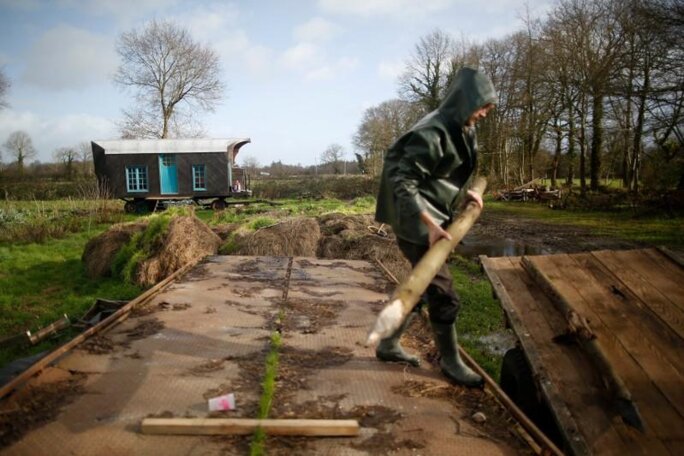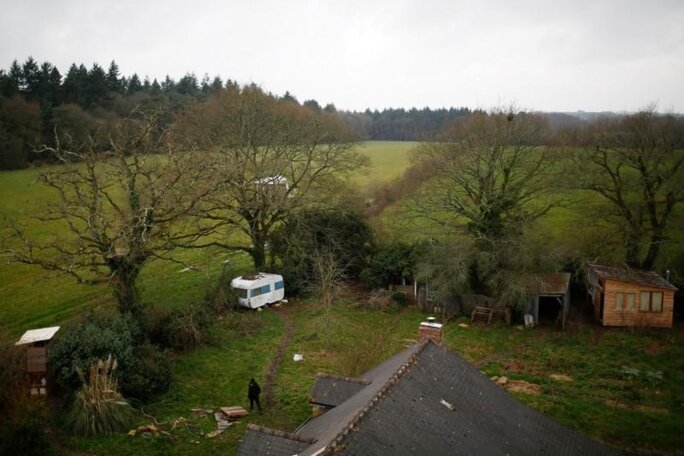French Prime Minister Édouard Philippe on Wednesday announced his government’s decision to abandon plans to build a 580-million-euro airport in countryside close to Nantes in north-west France, putting an end to a 50-year-old a project which had become a major controversy, championed by local politicians and bitterly opposed by a wide alliance of environmentalists.
The “Great West” airport, which was to serve upwards of around four million passengers per year, was to be built by construction group Vinci at Notre-Dame-des-Landes, situated about 25 kilometres north-west of Nantes, on an area of 1,650 hectares of utilized farmland, dotted with small woods and ponds, occupied for almost a decade by opponents of the project.
“Such a development project which structures a territory for a century cannot be carried out in the context of exacerbated opposition between two almost equal sections of the population,” Philippe said. “Notre-Dame-des-Landes, I recognise, is the airport of division.”
In place of it, Philippe announced that an existing airport closer to Nantes, L'aéroport de Nantes-Atlantique which began operating commercial flights in the 1950s, would be redeveloped and expanded, along with that of Rennes-Saint-Jacques, situated north of the region in Brittany, while high-speed rail links to Paris airports would also be developed.
“This decision that we are taking today is a decision of reason and appeasement in a tense local context, an exceptional decision for an exceptional local situation,” added Philippe, who said it had “no ambiguity”, promising that “the land will recover its agricultural vocation” and that farmers already evicted would be allowed to reclaim their land.
But he issued a warning to activists opposed to the airport who have been occupying the site, who he called “squatters”, that they had until this Spring to evacuate it. Under French law, nobody can be evicted from their homes during the Winter period. “The forces of law and order are mobilised so that the process is carried out with respect of the law and that the squatters progressively free-up the land that does not belong to them,” said Philippe, insisting that he was determined to put an end to “a lawless area that has prospered for almost ten years in this zone”.
The much-awaited announcement provoked furious reaction from supporters of the project, including the socialist mayor of Nantes, Johanna Rolland, who on Twitter called the decision a “betrayal” and, in a reference to a previous online consultation of the local population that found in favour of the project, a “denial of democracy”.
The project for the airport at Notre-Dame-des-Landes had been vigorously supported by local politicians of both the Right and the Left, notably former socialist prime minister and mayor of Nantes Jean-Marc Ayrault, who argued that it was essential for the future economic development of the Loire-Atlantique region since the existing airport beside Nantes was saturated and a security risk and nuisance for the town’s population.
But a broad alliance of airport opponents, including local farmers and residents supported by environmentalist organizations and Green politicians, dismissed the claims, arguing that the environmental damage, both locally and from the wider polluting effects of increased air traffic, outweighed limited economic gains, and that the capacity of the existing airport and that in Rennes were sufficient.

Enlargement : Illustration 2

Resistance to the project became a national cause célèbre for environmentalists, beginning with the occupation of the site at Notre-Dame-des-Landes after an official go-ahead for construction was decided in 2008. Initially a small group of activists, the occupants of the site – which they name as a “Zone à défendre”, a “zone to be defended”, or ZAD, which is a neologism of the official administrative term for a site destined for future development – have built up over the years since into a community of several hundreds. This eclectic population of idealists and firebrands have created what they regard as an experimental commune, building homes and working the land. They successfully resisted an attempted forced eviction in 2012, months after the socialists were elected to government, and pledged, notably on the part of the more radical militants among them, to turn the site into a battlefield if police made further attempts to remove them.
Faced with the potential of serious injuries or worse if police intervened, coupled with the wider large opposition to the new airport from environmentalist movements, the project, initially planned to open in January 2017, stuttered under the government of then-president François Hollande, recurrently approving the construction and then postponing it, despite an online consultation of residents of the Nantes region who voted in favour of the new airport.
After Emmanuel Macron’s election as president last year, his government was left with what had effectively become a scalding political hot potato. Importantly, Macron, who during his election campaign had at one point appeared in favour of the airport’s construction, has adopted an international stance as a champion of measures to limit climate change, and his environment minister, Nicolas Hulot, is a veteran ecologist and campaigner and a figurehead for many environmentalists.
The government’s decision followed the delivery on December 13th of a report by a government-appointed panel of three mediators, in which for the first time alternative projects to the building of the airport were officially studied.
Announcing the government’s decision on Wednesday, Prime Minister Philippe, who joined President Macron's maverick centrist government after years of loyalty to the conservative Les Républicains party, admitted that he had at first been in favour of the airport's construction, but launched into a stinging attack on the handling of the project by his predecessors. “During 50 years of decisions, retreats, denials, non-decisions, the State placed itself in an impossible dilemma,” he said. “During all these decades, whereas everywhere else the country was engaged in large development projects, the indecision of successive governments has left the supporters of the [airport] project and its opponents confront each other, pitted against each other.”
“We could have acted like others, like those who today won’t shy from questioning us, in other words leaving for our successors the cutting of the Gordian knot,” continued Philippe. “After all, what would five more years have represented when, whatever decision was taken, no infrastructure would see the light of day in terms of an airport on the site during this [government’s] five-year term?”
His words were apparently principally aimed at François Fillon, prime minister under Nicolas Sarkozy’s 2007-2012 presidency, Jean-Marc Ayrault, the first prime minister to serve under Sarkozy’s successor François Hollande and Ayrault’s successor Manuel Valls, all of whom, for quite different reasons, ranging from economic liberalism, local political influence and building an image of championing law and order, supported the airport project without ever ensuring its construction.
Meanwhile, the activists occupying the site, in a collective statement published online later on Wednesday, have agreed to open up access to the area, but have vowed to continue to live there. “In the future, this territory must remain a space of social, environmental and agricultural experimentation,” they said.
'An ecological and economic absurdity'
Following Prime Minister Philippe’s announcement on Wednesday, Ayrault took to Twitter to comment: “I take note of the government’s decision and I regret it, it is a denial of democracy and a failure in the development of the Great West [region], I mark the date.”
The government’s decision was a “capitulation” for conservative Les Républicains (LR) party senator Bruno Retailleau, who heads the LR party in the Senate and who sits on the regional council of the Pays-de-Loire, a region close to the abandoned site for the airport. “The Zadists [those occupying the site at Notre-Dame-des-Landes] have won,” he said in a statement Wednesday. “The State has just vindicated thugs and disavowed the vote of citizens,” he added, referring to the 2016 online consultation of local inhabitants when a majority of 55.17 percent voted in favour of the airport’s construction.
The socialist president of the Loire-Atlantique département (administrative area equivalent to a county), Philippe Grosvalet, said the State had “trampled over the inhabitants of my département who had taken part in the vote”.
“It tramples on the universal suffrage which is the base of our republic and our democracy,” he continued. “There will be disastrous consequences for our democracy. The inhabitants of the Loire-Atlantique have told me in number that they will never vote again, never again will they place a vote in the urns. It is [Emmanuel Macron’s] first major repudiation. He makes us believe that it’s a choice whereas it’s a non-choice. They caved in to disorder. The first turning back by the president and the prime minister is in face of a gang of Zadists [activists occupying the site].”
While the ecologist camp hailed a victory, France’s principal Green party, Europe Écologie-Les Verts (EELV) was visibly concerned for the future of the community that occupies the site, calling for “a freeze of the administrative redistribution of land, so that it continues to be managed by those who fought for it”.

Enlargement : Illustration 3

Bastien Lachaud, an MP for the radical-left France Insoumise (France Unbowed) party, which has attempted to position itself as the principal opposition to Macron’s government since the debacle of the socialists in last year’s presidential and parliamentary elections, took to Twitter to say: “At last the government abandons the project for the airport at NDDL, an ecological and economic absurdity. The Zadists have contributed to this awareness that serves the public interest. They should be thanked and not brutalised.” His party issued a statement demanding that the government “demonstrates calm and measure for a positive outcome in all respects. An expulsion of the ZAD would be incomprehensible”.
Meanwhile, members of Macron’s LREM party applauded the decision announced on Wednesday, which the speaker (president) of the National Assembly, the lower house, François de Rugy – a former EELV Green party member who later joined the parliamentary socialist group before rallying the LREM – said had been “difficult to take”. Rugy, an MP representing a constituency in Nantes, described the choice as “wise”, adding: “It demonstrates that it is possible to find a conciliation between the growth in air traffic and the respect of major challenges for ecology and the protection of biodiversity.”
Matthieu Orphelin, an MP with LREM representing a constituency in the nearby Maine-et-Loire département, a close ally of environment minister Nicolas Hulot and who has publicly voiced his opposition to the airport, applauded a “difficult but responsible decision”, adding: “There was no easy decision, given how the project had become bogged down over the years, vitiated by the absence of studies for alternatives.”
Joining the chorus was Richard Ferrand, a former socialist who rallied behind Macron’s presidential bid and who now heads the president’s LREM party parliamentary group and who is fighting corruption allegations. Ferrand, an MP for a constituency in Brittany, the neighbouring region north of that surrounding Nantes, has previously come out in favour of the airport project, but on Wednesday he declared: “At last a decision is taken […] The government’s choice was taken in full consciousness of the numerous and complex aspects of the case. Finally, after 50 years of dillydallying we’re out of the impasse, thanks to an open and clear process.”
-------------------------
- This article is an abridged version of a Mediapart report in French that can be found here.
English version with additional reporting by Graham Tearse


